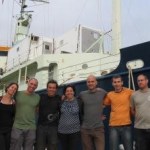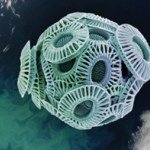phytoplankton
One of our scientists, Dr. Assaf Vardi, is off on a month-long cruise. He is on the Knorr, a research vessel operated by the Woods Hole Oceanographic Institute, with a team from the Weizmann Institute and another four research teams on a route that will take them from the Azores to Iceland. On the way, they will be sampling the plankton; among other things they want to understand how the molecular processes that take place in these single-celled organisms affect everything from the ocean's food chain to the oxygen in the atmosphere. Rose Eveleth is posting from the ship daily on the…
Some of the best moments in my job as a Weizmann science writer are the times when a scientist I'm interviewing slips in a finding that shifts my understanding of how the world works. Not long ago, for instance, I was speaking with a researcher about his work on phytoplankton. Now, the fact that phytoplankton release about half of all the free oxygen on the planet should be an eye-opener to anyone, and a reminder of the importance of ocean health. (But that wasn't the surprise.)
Dr. Assaf Vardi researches the chemicals that phytoplankton produce to communicate. Of course, all sorts of…
Earlier this week we talked about how to use whale snot for science.
I especially enjoyed blog bff Scicurious's take on the study:
Budgetary requirement: $5000 for series of expensive remote control helicopters.
Source: Toys R Us.
Justification: Need something that can fly close to a whale and collect snot for measurement. Also, this is the only kind that comes in red, and the gunmetal grey ones suck.
This day, however, we will travel farther, er, south. Through the mouth, down the esophagus, into the stomach, detour through the intestines, take a left at the sphincter, but, what, what's…
Say the word iceberg, and most people are likely to free-associate it with 'Titanic'. Thanks to James Cameron (and, well, history too), the iceberg now has a reputation as an cold murderous force of nature, sinking both ships and Leonardo DiCaprio. But a new study shows that icebergs are not harbingers of death but hotspots of life.
In the late 1980s, about 200,000 icebergs roamed across the Southern Ocean. They range in size from puny 'growlers', less than a metre long, to massive blocks of ice, larger than some small countries.
They may be inert frozen lumps, but icebergs are secretly…

